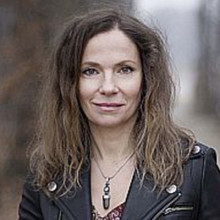Polish literature

Joanna Bator
Joanna Bator (b. 1968) is a fiction writer, journalist and a university professor. Her first book, published 2001, was Feminism, postmodernism, psychoanalysis [Feminizm, postmodernizm, psychonaliza], a theoretical work. A year later, Bator debuted as a novelist with A Woman [Kobieta]. But it was only her third book, The Japanese Fan [Japoński wachlarz] (2004), that brought the author acclaim among critics and readers alike.
The book is a collection of essay-like reportage pieces, a result of the author’s two-year stay in Japan. This original work, a winner of the Beata Pawlak Memorial Award, became in Poland a classic guide to Japanese culture and way of life.
Following a few years’ silence, the writer showed a brand new face as the author of a two-part novel set in the town of her birth, spanning several decades: from World War Two until the modern day. Even though the critics like to refer to The Sandy Hill [Piaskowa Góra] (2009) and Cloudalia [Chmurdalia] (2010) as a family saga, this classification is to be considered merely a nod towards convention. The diptych refuses to be pegged as a representative of any single genre, since it combines elements of a historical novel, a novel of manners, a saga, an anthropological treatise and a utopia, to name but a few. What brings all those together is the way of representation, the author’s sense of humour and her employment of scholarly tools in the depiction of her characters, while steering clear of the scholarly language.
Bator’s another novel, Dark, Almost Night [Ciemno, prawie noc] (2012), a story of a reporter returning to her home town to write a piece on missing people, who ends up facing her own past, was filmed.
The author then moved on to write another intimate essay titled The Teardrop Island [Wyspa Łza] (2014), a document on her journey to Sri Lanka tracing the vanished Sandra Valntine, and the novel The Year of the Rabbit [Rok królika] (2015), in which another heroine has to confront her past and her demons in a quite illusory town of Frankenstein. Purezento (2017) is Bator’s first novel set in Japan, with the main character setting off not only on a journey through Japan, but also through her own sense of loss and romantic renewal.
Bator’s novels are typically populated by women confronting their past and traumatic events in their lives. In Drink Up Your Fill [Gorzko, gorzko] (2020) Kalina, the book’s protagonist, has to travel back in her family’s herstory in order to set herself free from traumas passed on over generations. The whole thing is saturated in a mixture of realism and magic, which many readers will find engaging. The Flight of the She Bear [Ucieczka niedźwiedzicy], Bator’s latest, is a novel about a search of freedom, about a makeover of one’s life while seeking to free oneself from the old one.
Joanna Battor’s undisputed storytelling talent has been recognized by nominations for the most prestigious Polish literary awards: the Nike and Gdynia Literary Award (both for The Sandy Hill). For Drink Up Your Fill she received the Nike.
BIBLIOGRAPHY
- Feminizm, postmodernizm, psychoanaliza, Gdańsk: słowo/obraz terytoria, 2002.
- Kobieta, Warszawa: Twój Styl, 2002
- Japoński wachlarz, Warszawa: Twój Styl, 2004.
- Piaskowa Góra, Warszawa: W.A.B., 2009.
- Chmurdalia, Warszawa: W.A.B., 2010.
- Japoński wachlarz. Powroty, Warszawa: W.A.B., 2011.
- Ciemno, prawie noc, Warszawa: W.A.B., 2012.
- Rekin z parku Yoyogi, Warszawa: W.A.B., 2014.
- Wyspa Łza, Kraków: Znak, 2015.
- Rok królika, Kraków: Znak, 2016,
- Purezento, Kraków: Znak, 2017
- Gorzko, gorzko, Kraków: Znak, 2020
- Ucieczka niedźwiedzicy, Kraków: Znak, 2022
TRANSLATIONS TO OTHER LANGUAGES
Bulgarian:
- Тъмно, почти нощ [Ciemno, prawie noc], transl. Krum Krumov, Sofiâ: Ciela Norma, 2017.
Croatian:
- Pješčana gora [Piaskowa Góra], transl. Mladen Martić, Zaprešić: Fraktura, 2013.
- Gorko, gorko [Gorzko, gorzko], transl. Mladen Martić, Zaprešić: Fraktura 2023.
Czech:
- Pískový vrch [Piaskowa Góra], transl. Iveta Mikešová, Praha ; Litomyšl : Paseka, 2015
French:
- Le Mont-de-Sable [Piaskowa Góra], transl. Caroline Raszka-Dewez, Lausanne: Les Editions Noir sur Blanc, 2014.
Hebrew:
- Ḥoshekh, ki-meʻaṭ lailah [Ciemno, prawie noc], transl. Ilay Halpern, Moshav Ben-Shemen: Keter, 2018.
- Piaskowa Góra, transl. Ilay Halpern, Keter Books, 2012.
Macedonian:
- Piesoczna planina [Piaskowa Góra], transl. Aneta Todewska, Skopije: Makedonska Riecz, 2013.
- Tiemno, rieczisi nok [Ciemno, prawie noc], transl. Aneta Sapeta, Skopje: Makedonikja Litera, 2015
German:
- Dunkel, fast Nacht [Ciemno, prawie noc], transl. Lisa Palmes, Berlin Suhrkamp, 2016.
- Sandberg [Piaskowa Góra], transl. Esther Kinsky, Berlin: Suhrkamp, 2011, 2014.
- Wolkenfern [Chmurdalia], transl. Esther Kinsky, Berlin: Suhrkamp, 2014.
- Bitternis: Roman: ein Epos über starke, zornige Frauen [Gorzko, gorzko], transl. Lisa Palmes, Berlin: Suhrkamp Verlag 2023.
Serbian:
- Mračno da skoro je noc [Ciemno, prawie noc], transl. Jelena Jović, Belgrad: Korektura Booka 2016.
Slovenian:
- Temno, skoraj noč [Ciemno, prawie noc], transl. Jana Unuk, Ljubljana: Cankarjeva založba, 2018.
- Peščena gora [Piaskowa Góra], transl. Staša Pavlović; Tina Podržaj, Novo mesto: Goga, 2017.
Ukrainian:
- Piszczana Gora [Piaskowa Góra], transl. Natalka Sniadanko, Lwów: Astroliabija, 2015.
Hungarian:
- Homokhegy [Piaskowa Góra], transl. Péter Hermann, Budapest: Magvető, 2011.
- Homokfelhő [Chmurdalia], transl. Péter Hermann, Budapeszt: Magvető, 2014.
- Szinte éjsötét [Ciemno, prawie noc], transl. Péter Hermann, Budapeszt: Magvető, 2016.
Italian
- Montagna di sabbia [Piaskowa góra], transl. di Barbara Delfino, Roma: Voland 2022.
English
- Dark, almost night, transl. Magdalena Zebracka, University of Iowa, 2020.